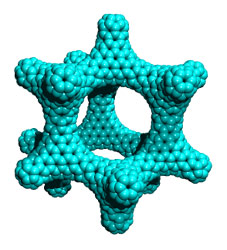|
 New Delhi: A team of five Bangalore-based researchers headed by Dr CNR Rao, scientific advisor to the Indian prime minister, has discovered the world's hardest plastic nano-composite material, which is also capable of being used in missiles and aircraft. New Delhi: A team of five Bangalore-based researchers headed by Dr CNR Rao, scientific advisor to the Indian prime minister, has discovered the world's hardest plastic nano-composite material, which is also capable of being used in missiles and aircraft.
The team created the material by reinforcing ordinary plastic with nano-diamonds, a sheet of layered carbon honeycomb and tiny carbon nano-cylinders. Nano dimensions are smaller than the width of a single strand of human hair, with one nano-metre being one millionth of a millimetre.  The team reinforced a common polymer with nano-diamond, a new age material called graphene (one atom thick carbon honeycomb sheet) and carbon nano-tube producing the new material. The team reinforced a common polymer with nano-diamond, a new age material called graphene (one atom thick carbon honeycomb sheet) and carbon nano-tube producing the new material.
''The mechanical properties like hardness and stiffness (after moulding) improved by as much as 400 per cent compared to those obtained with single reinforcements,'' the researchers reported in the 'Proceedings of National Academy of Sciences'. Drawn from the Indian Institute of Science and Jawaharlal Nehru Centre for Advanced Scientific Research (JNCASR), the team of researchers worked on an original idea from Dr Rao. An eminent scientist, Dr CNR Rao is also the founding president of the JNCASR. Team members have said that despite its hardness the material was extremely light-weight.  ''It can be used in missile and aerospace engineering. However, we have not yet looked into the application side,'' they said. ''It can be used in missile and aerospace engineering. However, we have not yet looked into the application side,'' they said.
Although the use of nano-materials as reinforcing agents is nothing new, the Bangalore team has been innovative in using a combination two nano-materials to reinforce a polyvinyl alcohol polymer. The team evolved two usable combinations – graphene with nano-diamonds and carbon nano tubes with nano-diamonds. Both combinations resulted in the development of ''high-performance polymer matrix composite.'' High performance in the material evolves from the synergy taking place between polymer and nano-materials. Despite being the world's hardest plastic nano-composite, the newly developed reinforcement material constitutes only one per cent of the weight of the composite. To create a similar material using conventional methods, 50-60 per cent glass would be required to act as the reinforcing agent and the resultant composite cannot be moulded. Besides displaying excellent mechanical properties, the scientists said the reinforced polymer also reveals semi-conducting behaviour, which too can be exploited. To assess the practical applications that the new material can be put to, scientists will have to analyse the material's toughness and ductility. This is the next step.
|